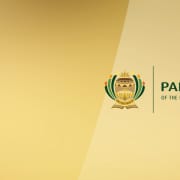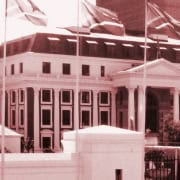|
Getting your Trinity Audio player ready...
|
By Moepeng Talane
South Africa’s electorate may have taken decisive action in the 29 May polls to help discontinue the one-party rule era that we have seen since the dawn of democracy, but a whole month later, the official announcement on who will lead in the Cabinet of the government of national unity is yet to be made.
There are only so many positions in Cabinet and the bureaucratic structures that fall immediately underneath that level, but there were 10 parties in the GNU at last count, and the delay in the announcement can only be attributed to their struggles in finding each other.
Whatever the make-up of the much-anticipated Cabinet we end up with at the end of those deliberations, however, the lawmakers who will oversee the Cabinet’s executive tasks and hold them accountable as per the Constitution have been duly sworn in.
We have now witnessed the swearing in of all 400 members of Parliament (MPs), with the most recent group of MK Party members taking their oath earlier in the week after boycotting the initial sitting of Parliament where the majority were sworn in. Among the group that was sworn in on Tuesday is former ANC NEC member Zizi Kodwa. He resigned from the party’s highest structure as well as his post as sports, arts and culture minister in early June, upon being charged for corruption and money laundering.
From controversy to honourable members
While waiting on the Cabinet announcement, we have had plenty of time to cast our attention to the quality of MPs who made it onto the various political parties’ lists, and never before have the standards of party leadership selection for Parliament come under so much fire – from those on whom much has been written about corruption allegations hanging over their heads, to those like the DA’s Renaldo Gouws, whose past public rant on race and politics has come back to haunt him.
We even saw the return of Andile Mngxitama, who was initially with the EFF and later went on to form his own party, Black First Land First, as a representative of the MK Party.
Among the other names that have raised eyebrows are impeached judge John Hlophe as MK’s leader in Parliament, and impeached public protector Busisiwe Mkhwebane as an EFF MP. Perhaps not so much the latter, as she is returning for a second stint. Kodwa, Hlophe, and Mkhwebane represent different political parties with different ideologies and political cultures, and the political impact of their inclusion in the national legislature will no doubt be felt over time, but their past indiscretions will not escape many who look forward to seeing how the formation of a differently structured government will play out in the National Assembly.
Legality vs ethics
Perhaps it is fair at this point to mention that legally, none of the three or any others who enter Parliament with dark clouds hanging over them, are prevented from doing so.
Section 35 of the Constitution is clear on the rights of accused persons, a category under which Kodwa falls. He is presumed innocent until proved guilty in a court of law. The other two have undergone democratic processes that – ironically – concluded in the same Parliament that they will now serve in and which found them unfit for the positions they previously held. But no law prevents any of them from joining, and being part of Parliament, if it is the desire of the party they represent.
So legally, they are fine. But then this brings us to the point of ethical conduct by political party members and the standards of accountability within party structures in such circumstances.
A mere three months ago, the then speaker of Parliament and another senior member of the ANC, Nosiviwe Mapisa-Nqakula, resigned abruptly from her position hours before she was to be officially charged for corruption. In a statement that she released, endorsed by the ANC, she stated that her resignation – on the cusp of the sixth and the seventh parliaments – was in the best interest of the institution whose integrity she felt responsible to protect.
There were mixed views to her resignation, with some believing that it was done under pressure from her party in the lead-up to the elections, and others commending her for doing the right thing by Parliament.
Around the same time our attention was fixed on Mapisa-Nqakula, Kodwa’s name was being added to the ANC’s parliamentary list, despite his presence in a group of ANC leaders named in the Zondo Commission report as to be investigated by law enforcement.
The notable difference between Kodwa’s position and that of Mapisa-Nqakula then, it seems, is that one was charged in the pivotal period before the elections, and the other after. It begs the question then over what the ANC deems pivotal in their step-aside culture that is touted as a part of its renewal campaign. Even more important, is whether the individuals named in processes such as the commission deem it their responsibility to do their own stepping aside, without the party having to order it.
Unfit to lead
In the case of Mkhwebane and Hlophe, who represent relatively smaller parties that have never overseen government and its resources, it seems that these parties use their prerogative to usher in individuals who are spurned and isolated by the ANC-led government for whatever reasons, but presumably for differences in their politics, among other things.
But the same question applies to them.
We are constantly reminded of the need to hold our leaders accountable as they are charged with making our country work for us, the electorate. But at what point is the standard going to be raised beyond just that of being protected legally, to exclusion in Parliament?
Kodwa told the media on the day of his swearing in that it was up to his party to answer questions relating to its step-aside rules as they apply to him. This is the same individual who removed himself from his cabinet post as well as that of the ANC NEC out of a responsibility to protect those institutions, but accepted the call to join Parliament at a time when he was implicated by the commission and had to have known that formal charges were not too far off.
Equally, Hlophe and Mkhwebane were removed from the institutions that they led after being found unfit to continue leading them. Both processes called to attention their capacity to lead public institutions with professional integrity and in the best interest of the public.
It begs the question of whether political parties consider the prospects of deploying such members in other capacities that allow them to contribute much-needed skills without using Parliament as a platform for political scoring and to settle scores.
The legislature is a very important instrument of democracy, and one that goes beyond settling political scores or bringing in allies to bolster political favourability when decisions are made.
It is also a coming together of individuals who wholeheartedly believe in the oath they take, respect the value of leading with undoubtable integrity, and commit to the best interests of all South Africans – not just the constituencies who placed them there.








